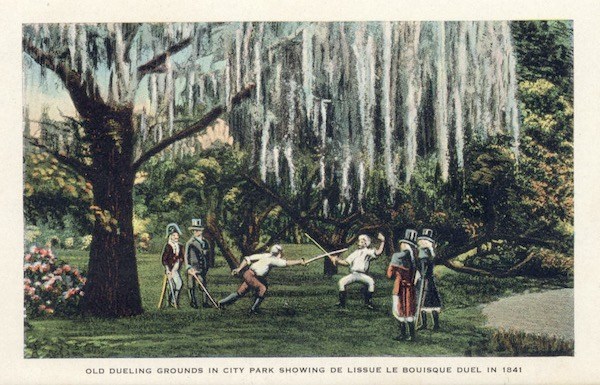Legal Humor, Uncategorized
Man Requests Trial by Combat in Custody Battle
Mr. David Ostrom of Paola, Kansas, frustrated by a custody battle with his ex-wife, has requested the Iowa District Court grant his motion for trial by combat, as the insults and troubles he alleges caused to him by his adversaries are so grave that satisfaction and justice can only be found “on the field of battle where (he) will rend their souls from their corporeal bodies.”
Of course, in this day and age, gentlemen such as Ostrom rarely have the appropriate soul-rending instruments at immediate hand, and therefore, Ostrom further requests of the Court a 12 week continuance in which he might procure or forge a suitable katana or wakizashi sword.
Ostrom argues that trial by combat has never been explicitly legally banned. He would also allow his ex-wife to select a champion to fight for her. Ostrom suggests that her attorney, Mr. Matthew Hudson, accept this honor, but Mr. Hudson appears to have declined, helpfully advising that “a duel could end in death.”
As sensational as this may seem to some, the trial of legal questions through combat has been requested of courts in the very recent past. In 2015, a New York defense attorney, feeling himself dishonored by the allegations of his adversary, moved for the opportunity to dispatch the offending party over the River Styx. It appears that this request wasn’t granted.
While this might seem strange in Iowa, Kansas, or New York, in New Orleans, satisfaction through combat is well established in tradition, and was practiced by the finest and most upstanding members of the community. In fact, according to preeminent historical scholar Alcée Fortier, more than ten individual duels were fought on a single Sunday in the city, and more duels were fought here in the 1830s than in any other city in the world!
Honor, especially the honor of the French Creoles, demanded that a gentleman be prepared to avenge insults on the field of battle. Schools were established throughout Old New Orleans where the young sons of prominent families would learn the art of swordsmanship.
Of course, not everyone in the city believed that men should be permitted to engage in consensual single combat. Dueling was technically illegal in New Orleans, but as it was a widely practiced cultural norm, not many were likely to report a duel to the authorities. Also, there was a very good chance that the authorities themselves might also have satisfied their honor on the field once or twice!
While the law itself didn’t concern New Orleanians, deference to the sanctity of law was something else entirely, and it became common to conduct one’s dueling in places that wouldn’t offend or inconvenience the general public, nor flaunt the dueler’s disregard of laws offensive to his own honor. Famously, a pair of grand live oak trees on the Allard Plantation became a popular site for settling an affaire d’honneur. Today, the Allard Plantation site comprises New Orleans City Park, and locals and visitors alike can visit the spot, where one of the trees still stands.
With the recent interest in judicially sanctioned dueling, nostalgic New Orleanians may cherish faint hopes that one day, a motion may be heard in Civil District Court to permit the remedying of insults in the most traditional of manners: on the field of honor.
About Author
Comments are closed









